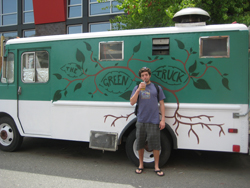|
For perhaps the first time on Temple’s campus, foodies have a choice that extends beyond cheese steaks and chicken tenders. It’s organic, it’s delicious, and its mission of sustainability feeds your conscience.
Stationed outside the Student Center between two nondescript food mobiles is the Green Truck, Temple’s first organic food outlet. The Green Truck is a joint project between two students in Students for Responsible Business —a student professional organization in the Fox School of Business — and the truck’s owner, Rudi Gurra.
Ben Schneible, a sophomore in international business, and Arne Morin, a junior in entrepreneurship, began the effort out of what they saw as a dearth of healthy and environmentally aware eateries on campus.
|
|
Photo courtesy Ben Schneible
Fox School sophomore in international business, Ben Schneible, in front of the Green Truck, a joint project between two students in Students for Responsible Business — a student professional organization in the Fox School of Business — and the truck's owner, Rudi Gurra.
|
|
“The mission is to support the local economy, lower CO2 emissions and buy from producers that are environmentally conscious,” Schneible said.
These objectives complement each other: by purchasing meat and produce from local farms, the Green Truck not only assists communities in the Northeast but cuts down on the transportation of food, thus lowering the truck’s carbon footprint.
That same goal pervades all of the Green Truck, short of the generator required to run it. Consumers save 50 cents for bringing their own cups for iced tea. The sweet potato fries (bought from a North Carolina farm) are presented in thin paper sleeves instead of bulky cardboard pouches, while salad containers are made of biodegradable corn plastic. And the underdeveloped spot on the left end of the truck is prepped to become a mini information center on all things environmental.
“It’s created a lot of buzz on campus,” said Lisa Calvano, lecturer in business, society and ethics, and faculty adviser of Students for Responsible Business. “It’s a great model for partnerships between the university, business and the community.”
|
Net Impact, a nationwide network of M.B.A.- and professional-level student organizations that advocate social change through business, has opened its doors for the first time this year to 23 undergraduate programs, including the Fox School of Business.
The Fox School’s undergraduate student professional organization Students for Responsible Business has been welcomed into Net Impact, which will connect the group with students in academic institutions throughout the United States to share ideas and resources.
“Net Impact was very excited about us because we already have a group up and running,” said Lisa Calvano, a lecturer in human resource management, and the Students for Responsible Business faculty advisor. “We now have this national connection, so theoretically in the future we can work with groups in other universities, draw upon the wider Net Impact network, and it’s good for students because it provides them with networking opportunities.”
The Fox School and the University of Pennsylvania’s Wharton School are the only two undergraduate programs in Philadelphia welcomed into Net Impact.
In addition to starting the Green Truck, SRB co-sponsored the Africa Open for Responsible Business Summit in February along with the Francophone and IBA student professional organizations. Approximately 150 students, business owners and government representatives attended the event.
The participating student groups later donated all proceeds above expense-reimbursement to Kiva, a microfinance organization that links individual lenders to borrowers with small businesses, such as a fish stand, across the globe.
|
|
Launched on Spring Fling, the Green Truck began as a conversation between owner Gurra and Schneible.
“It used to be an unsuccessful cheese steak and hamburger place,” Schneible said. “It basically sold the same things that 80 percent of everywhere else does.”
The two had spoken about their shared taste for organic foods. Gurra said business was down and that a prospective buyer of the truck had failed to follow through, and Schneible saw Gurra’s apparent misfortune as an opportunity to act on his group’s mission statement.
“I said, ‘Listen, I’m from Students for Responsible Business. Let me help you develop this business,” Schneible said.
Since Gurra’s truck went green, business is up 400 percent, Schneible said. The cheese steaks and hamburgers have been replaced with chicken Caesar salads and Greek pita wraps. Even the truck has been painted green.
Unfortunately, purchasing everything locally isn’t always practical even if it’s possible. Buying sweet potatoes from the Pennsylvania Dutch would have been roughly five times costlier than potatoes from North Carolina, Schneible estimates, and would have kept them out of reach of students’ budgets. And since China produces the vast share of the world’s garlic, finding a local producer is almost impossible.
But even buying products from the Northeast, like hummus from Maine, drastically cuts down on CO2 emissions. As the business grows, Schneible and Morin hope more and more will be
|
|
produced closer to southeast Pennsylvania. Already, the free-range steak and bacon come from Lancaster, and the samosas are made right in West Philly.
“You’ll see in the fall what this place is going to be,” Schneible said. “It’s going to be a landmark for the university.”
—Written for the Temple Times by Andrew Thompson
|
